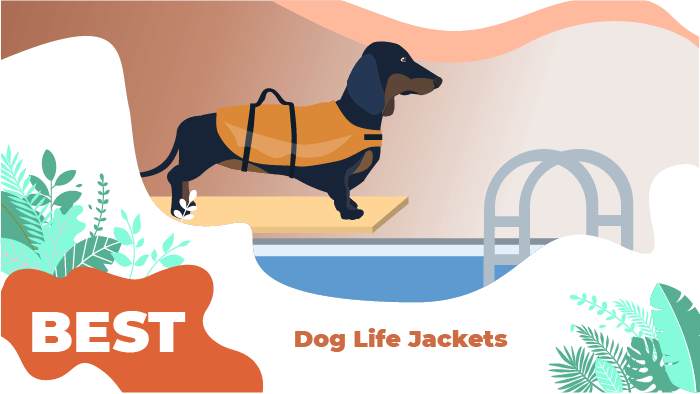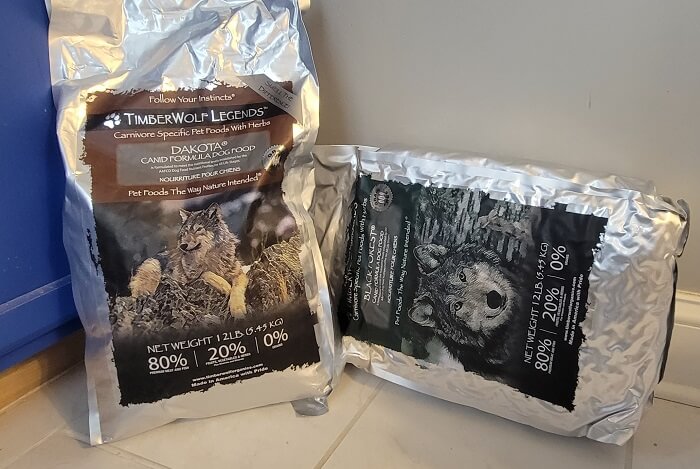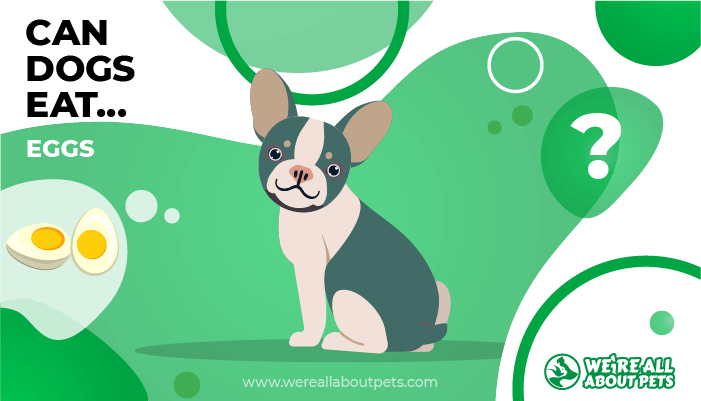Can Dogs Eat Peanuts?
This page contains affiliate links. We may earn money or products from the companies mentioned in this post through our independently chosen links, which earn us a commission. Learn More
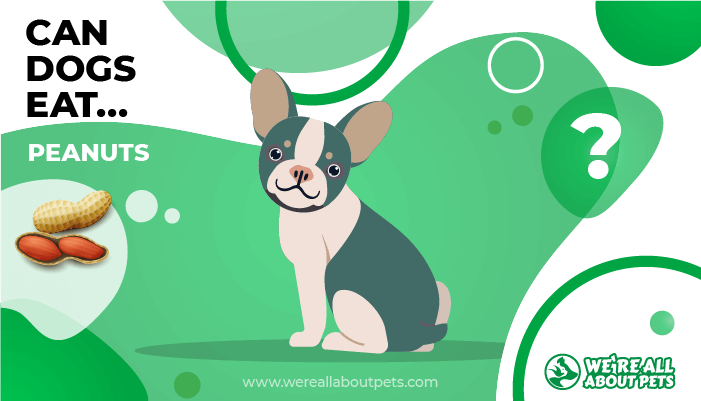
You probably know that most dogs love peanut butter. So, it must be okay for dogs to eat peanuts, right? Can dogs eat peanuts?
That’s a little trickier. Peanuts (and peanut butter) have some real health benefits for your dog. But peanuts can also have some things you need to beware before you give some to your dog.
Keep reading to find out what kind of peanuts are safe for your dog.
Peanuts Nutrition Stats
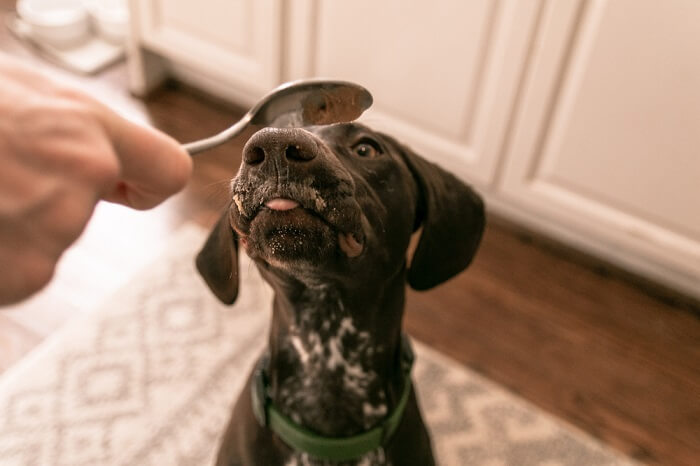
The nutritional information provided here is for one cup (146 grams) of peanuts, dry-roasted with no salt.
- Calories: 854 (43% daily value)
- Protein: 34.6 g (69% daily value)
- Carbohydrates: 31.4 g (10% daily value)
- Fat: 72.5g (112% daily value)
- Fiber: 11.7 g (47% daily value)
- Vitamin E (Alpha Tocopherol): 10.1 mg (51% daily value)
- Manganese: 3.0 mg (152% daily value)
- Vitamin B6: 0.4 mg (19% daily value)
- Phosphorus: 523 mg (52% daily value)
- Copper: 1.0 mg (49% daily value)
- Sodium: 8.8 mg (0% daily value)
- Zinc: 4.8 mg (32% daily value)
- Selenium: 11.0 mcg (16% daily value)
- Thiamin: 0.6% mg (43% daily value)
- Folate: 212 mcg (53% daily value)
- Pantothenic Acid: 2.0 mg (20% daily value)
- Sugars: 6.1 g
- Potassium: 473 mg (14% daily value)
- Calcium: 78.8 mg (8% daily value)
- Magnesium: 257mg (64% daily value)
- Niacin: 19.7 mg (99% daily value)
- Riboflavin: 0.1 mg (8% daily value)
- Iron: 3.3 mg (18% daily value)
- Choline: 80.7 mg
Peanuts contains 15 percent carbohydrates, 71 percent fats, and 14 percent protein.
Peanuts Nutritional Facts At A Glance
Peanuts are not nuts, despite their name. They are part of the legume family. This means they are related to peas, soybeans, beans, and many other foods that are grown for consumption.
Peanuts are something of a nutrient powerhouse. They are high in protein and calories for energy. They are also very high in many vitamins and minerals such as the B vitamins (niacin, thiamin, vitamin B6) and manganese. They also contain large amounts of vitamin E, phosphorus, copper, zinc, folate, and magnesium. They are a rich source of biotin.
Peanuts are considered a good source of plant-based protein. The most plentiful proteins in peanuts – arachin and conarachin, can produce severe allergic reactions in some people, even leading to life-threatening events. In the West, it’s estimated that between 1.5 and 3 percent of people have a peanut allergy. This percentage has increased over time.
Peanuts are also very high in fat and fiber but very low in cholesterol and sodium.
Much of the fat in peanuts is considered to be healthy fat. It contains mono- and polyunsaturated fats with oleic and linoleic acids.
According to some studies, eating peanuts regularly (1.5 ounces per day) as part of a diet low in saturated fat and cholesterol may help reduce the risk of heart disease.
Peanuts are usually eaten dry roasted or as peanut butter. They are rarely eaten raw though they can be. They become less healthy when they are salted.
Along with peanut butter, peanuts are also used in peanut oil, flour, desserts, and some cuisines.
Peanuts are low in carbohydrates. As a food that is high in protein, fat, and fiber and low in carbs, peanuts can be a good food for people concerned about diabetes. They are low on the glycemic index since the sugar in peanuts is slow to enter the bloodstream. Peanuts don’t lead to blood sugar spikes.
Peanuts are rich in antioxidants. Most of the antioxidants are found in the peanut skin which is usually missing when peanuts are dry roasted, but peanuts still contain antioxidants such as p-Coumaric acid, Resveratrol, Isoflavones, Phytic acid, and Phytosterols. Phytic acid is an antinutrient which can prevent your body from absorbing iron and zinc.
If you eat a well-balanced diet then eating peanuts shouldn’t be a problem but if you rely on too much peanut butter for nutrition, the phytic acid and other antinutrients in peanut butter could become problems. They could deprive your body of some of the minerals you need.
According to some studies, peanut butter does not appear to contribute to weight gain or obesity even though it is high in fat and calories.
In some cases peanuts can be contaminated with a kind of mold that produces aflatoxin.
Aflatoxin poisoning is not common but it occurs occasionally. Good drying and storage methods can help prevent this problem.
Can Dogs Eat Peanuts?
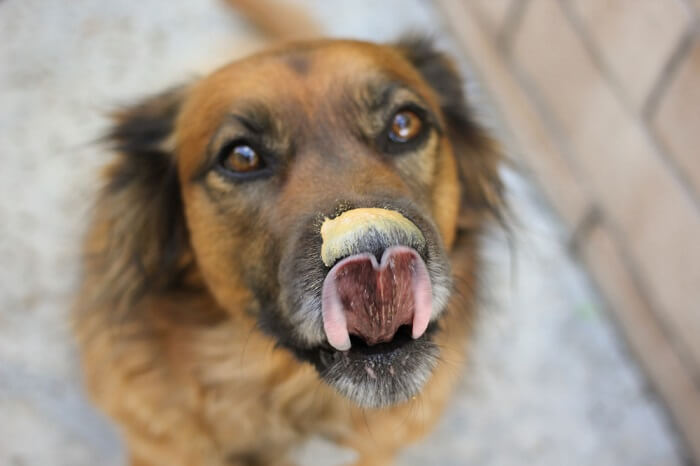
Yes, dogs can eat peanuts as long as they are plain. Most people prefer dry roasted peanuts that are smothered in salt. It’s best not to give your dog salted peanuts. (But don’t freak out if you drop some and he eats a few.)
Unsalted peanuts are safer for your dog as dog treats. Salted peanuts contain sodium that can be harmful to your dog, especially if he eats peanuts in large quantities.
This is also why some people prefer to make their own peanut butter for dogs. They can control the salt content and make sure there is no xylitol. Xylitol is an artificial sweetener which is toxic to dogs though it doesn’t hurt humans. The toxicity in this sugar substitute can kill a dog. Unfortunately, it’s found in many commercial peanut butters today. Making your own dog peanut butter is not hard and you know the food is safe.
Even though peanuts contain healthy fats, it’s still possible that gorging on peanuts could lead to a serious problem such as pancreatitis so don’t let your dog eat himself sick.
Are Peanuts Good For Dogs?
Plain or unsalted peanuts are good for dogs, in moderation. They are high in protein, niacin and other B vitamins, manganese, and other vitamins and minerals. They are also high in healthy fats and provide a good source of energy. And they are low in carbohydrates and high in fiber. So, peanuts can be good for dogs in many ways.
However, they should not be given to your dog in excess. Peanuts contain several antioxidant compounds that are antinutrients. These antinutrients prevent the body from absorbing certain minerals so they can be harmful if too many peanuts are consumed.
Like humans, some dogs can also have allergies to peanuts. It’s not known how common this reaction is. The first clinical case was reported in 2012. With more peanuts and peanut butter being used in dog products every year, there may be an increase in this kind of allergy since allergic reactions often become more common as an allergen becomes more common.
You should also avoid giving your dog honey-roasted peanuts and other flavored nuts that could be unsafe for your dog. These flavored peanuts could contain additives that could be harmful to your dog.
We also suggest that you do not let your dog eat mixed nuts that may contain peanuts along with tree nuts. Some tree nuts, such as macadamias, can be toxic to dogs.
If the peanuts still have the shell, make sure you remove it before giving them to your dog. The fibrous material of the peanut shell could be a choking hazard to your dog, especially for small dogs.
It should be fine to give your dog small quantities of plain (unsalted) peanuts occasionally. The first time you give your dog peanuts, start with just a few. Observe your dog afterwards to make sure he doesn’t have a reaction or any problems with his digestive system or an upset stomach. If you have any doubts, consult your veterinarian.
How Many Peanuts Can Dogs Eat?
There are about 35 peanuts in one ounce. That would equal 170 calories, 14 grams of fat, 2 grams of fiber, and 7 grams of protein. For most dogs of any size, that would be a lot of peanuts.
We suggest that you follow the 10 percent rule for treats and snacks. If your dog needs 1200 calories per day, he could have about 120 calories in treats and snacks (10 percent). That would be less than an ounce of peanuts.
How Often Can Dogs Eat Peanuts?
You could give your dog a few plain (unsalted) peanuts 3-4 days per week. It’s not recommended to give them to your dog every day.
The Correct Diet Is Important
Dogs need to eat the correct diet for good health. All dogs need good quality protein and fat appropriate for their age, lifestyle, and health condition in order to thrive. Most healthy dogs need the following things in their diet:
- Good Sources of Protein – Meat, fish, poultry, and eggs are all good sources of animal protein. Animal protein is generally easier for dogs to digest. The more accurately the protein is identified on the label, the better.
- Good Sources of Fat – Fat provides essential fatty acids (EFA) and helps distribute the fat soluble vitamins A, D, E, and K so your dog can absorb them easily.
- Named Ingredients – Named ingredients are usually better than generic ingredients. The more specific, the better, so you know precisely what your dog is eating.
- Low to Moderate Carbohydrates – Most experts recommend diets that contain low to moderate amounts of carbohydrates. Carbohydrates are not “bad” for dogs but they should not be used as a substitute for protein. Many carbs do double duty as dietary fiber and probiotics.
- Avoid Artificial Preservatives, Colors, and Sweeteners – Artificial preservatives and colors/dyes have been linked to some health problems in humans and animals. You should try to avoid these ingredients in dog foods.
- AAFCO – AAFCO is the Association of American Feed Control Officials. AAFCO sets voluntary standards for pet food labeling. Look for foods that have these minimum standards.
- Fresh Water – All dogs need access to fresh water unless they are ill or have some other reason to be temporarily kept away from water. For example, if you are house training your puppy, you can safely put away water overnight.
If your dog has health problems of any kind, please see a veterinarian for dietary advice. Regular diets may need to be adjusted. Your dog may not be able to eat some fruits and vegetables so ask your vet.
What Are Other Healthy Alternatives To Peanuts In A Dog’s Diet?
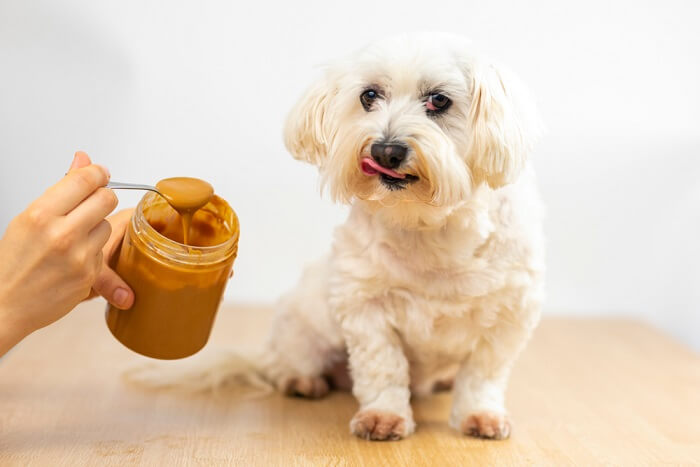
Peanuts make a nice treat for your dog but there are many other healthy foods you can give your dog in small amounts.
You should consider these human foods as occasional treats. Check with your veterinarian if your dog has any health issues and you are concerned about giving any of these foods.
Remember that not all parts of a fruit or vegetable are safe for dogs in some cases.
- Apples
- Asparagus
- Avocados
- Bananas
- Bell pepper
- Broccoli
- Brussels sprouts
- Cantaloupe
- Carrots
- Cauliflower
- Celery
- Cucumbers
- Green beans
- Mangos
- Oranges
- Parsnip
- Pears
- Pineapple
- Pumpkin
- Strawberries
- Summer squash
- Sweet potato
- Tomatoes
- Watermelon
- Zucchini
How Do You Give Your Dog Peanuts?
Most people enjoy feeding peanuts to their dog by hand. They may put a few peanuts in a dish for their dog. You could also use individual peanuts as a reward if you are training your dog.
You can also use plain peanuts to make peanut butter for your dog. Place plain peanuts in a food processor and let it run for 4-5 minutes. The peanuts will go from crumbs to a smooth, creamy state. You can add a little honey as a natural sweetener for your dog, if you like.
Conclusion
Many dogs enjoy peanuts and they can safely eat them as long as they are unsalted. Peanuts are a very healthy food. There can be a few things to note when you give your dog peanuts, such as a possible allergic reaction, but for the most part, peanuts are a safe treat for dogs.






